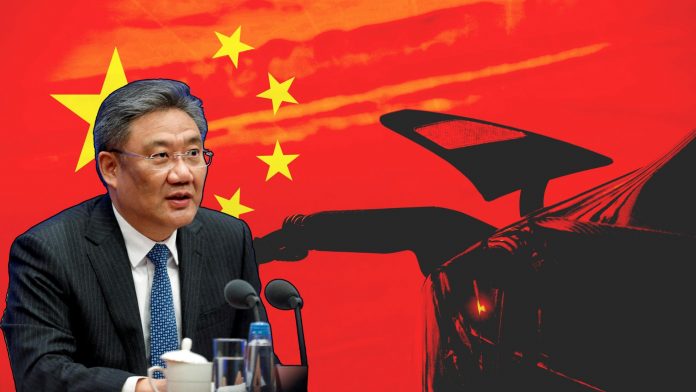China has strongly urged the United States to stop what it describes as “unreasonable suppression” of its companies. This follows U.S. proposals to ban Chinese software and hardware in vehicles due to national security concerns. The Chinese Ministry of Commerce criticized the U.S. government’s move, labeling it protectionist and a violation of fair competition and market economy principles. The proposal is seen as the latest escalation in a series of economic and technological tensions between the world’s two largest economies.
The U.S. Commerce Department on Monday revealed the planned regulation, first reported by Reuters, that would require automakers to remove Chinese software and hardware from vehicles connected to the internet or with navigation systems sold in the U.S. This sweeping measure aims to address growing national security concerns over data collection by connected Chinese vehicles and potential foreign control or manipulation of U.S. road infrastructure.
The Chinese Ministry of Commerce spokesperson strongly opposed the U.S. regulation, stating that it lacks a factual basis and constitutes unjustified protectionism. The spokesperson also claimed that the U.S. move disrupts cooperation in the field of connected vehicles, disrupts the global automotive industry supply chain, and harms U.S. consumers’ interests.
However, the proposed restrictions would not only ban future imports of Chinese vehicles into the U.S. but also force major automakers—including American companies and their global counterparts—to remove or replace existing Chinese components in their vehicles. This could involve removing Chinese-made software and hardware crucial to internet connectivity, navigation systems, and advanced driver-assistance technologies.
Escalating National Security Tensions
The backdrop of this latest U.S. move is the long-standing geopolitical rivalry between China and the U.S., with both sides frequently citing national security concerns as justification for their economic actions. The U.S. has already imposed significant export bans on semiconductors and other advanced technologies, limiting China’s access to critical tech necessary for its industries. These moves have sparked intense backlash from China, which views the restrictions as efforts to stifle its technological and industrial development.
The latest proposal to restrict Chinese software and hardware in U.S. vehicles adds a new dimension to these tensions. U.S. officials argue that the increasing integration of internet-connected systems in modern cars poses a potential cybersecurity threat, especially when those systems involve components from countries like China. The concern is that data gathered by these connected systems could be used for surveillance or manipulation by foreign powers, compromising the security of U.S. citizens and infrastructure.
Moreover, the U.S. automotive industry, which has seen increasing collaboration with Chinese companies, could face challenges in sourcing alternative suppliers. China produces or develops many components used in internet-connected systems and electric vehicles, making it an attractive option for global automakers due to the cost of production and the technology’s maturity.
Therefore, the Chinese government has warned that such measures will not only harm bilateral relations but also impact consumers in the U.S. by reducing the variety and affordability of vehicles on the market. “These actions will ultimately harm the interests of United States consumers by limiting their options and driving up costs,” the Chinese Commerce Ministry spokesperson said.
This latest development comes amid broader tensions between the U.S. and China over trade, technology, and security issues. Both countries have repeatedly imposed tariffs, sanctions, and regulatory restrictions on each other’s industries as they jockey for technological dominance and safeguard their national security interests.
Since the U.S. launched its trade war with China in 2018, both nations have experienced escalating conflicts over various sectors, including telecommunications, semiconductors, and energy. In the automotive sector, the competition has been particularly fierce, given the rapid advancement of electric and autonomous vehicle technologies, which are seen as the future of transportation.
For years, Chinese automakers have sought to penetrate the U.S. market but have faced resistance due to security concerns and existing trade barriers. The latest U.S. proposal would effectively bar any future Chinese vehicles or parts from entering the U.S. market, making it one of the most stringent policies to date to limit China’s influence on the global stage.
Moving Forward: China’s Call for Action
China is calling for the U.S. to retract its proposed measures, urging cooperation and dialogue rather than protectionism. “The U.S. should immediately revoke its restrictive moves,” the Chinese Ministry of Commerce stated, emphasizing that open trade and international cooperation are essential to the stability of global industries.
As the situation develops, the auto industry and consumers will be watching closely. Both sides remain at odds over how to balance national security concerns with the realities of global trade and interdependent supply chains. If the U.S. follows through with its proposed ban, it could reshape the automotive landscape, forcing both U.S. and Chinese automakers to rethink their vehicle production and market entry strategies.
For now, the future of U.S.-China cooperation in the automotive industry remains uncertain, with potential consequences for global supply chains, market competition, and consumer choice.



